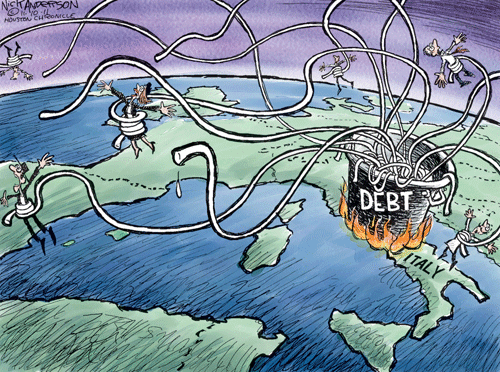By NY Brit Expat
An incident at dinner in Italy during my vacation there and the subsequent discussion has driven me to prioritise this piece. Following a wonderful dinner at a local restaurant, one man decided that it was time for us to listen to his misogyny on women’s reproductive rights. I knew he was saying offensive things as the two English speakers at the table refused to translate what he was saying. Upon my insistence, he tried to speak in English, but what he was saying was so offensive I refused to believe he was saying it. I turned to my husband and the other English speaking friend and they shook their heads yes, that is what he was saying. This man argued that women have to the right to choice but if they get pregnant with a child they do not want, they must be forced to carry the child to term and to give it up for adoption. Those that know me would not be surprised at my angry response in which I spoke of women having the right of property in their own body, spoke of bodily autonomy and reminded him that we were not incubators, but human beings. I concluded by calling him a misogynist and telling him that this was not an opinion but hate speech.
Abortion has been legal in Italy since 1978 when Law 194 was passed. While not a perfect law, it was won after intense struggle by the women’s movement. This law not only guaranteed access to abortion, but access to reproductive health care, contraception, and a whole range of rights for women and these were tied into public health provision. Like in the US (and this has been a failing in both countries), the conscientious objector clause has led to a decrease in the numbers of medical professionals willing to carry out the procedure on religious grounds (and in the US due to pressure from anti-abortion activists). So to hear someone (who is not religious) babbling this crap at me following dinner was way too much. So, who ruined dinner? Was it him or me?
This incident highlighted something that has become extremely obvious and this applies both to women’s rights and to racism. The days when someone who held these offensive positions knew to keep their mouths shut is long gone; instead they pose hate speech as opinion and demand their right to preach it. Our response must be swift and strong so that these troglodytes are driven back to the primordial soup from which they have barely crawled out from.
In a follow-up discussion on the way to the car park, I told my English speaking friend what just passed the British parliament as part of the Welfare Bill. I told him that the Tories are changing the nature of the social welfare state which covered all women (child-tax credits, child benefits) to only cover the poor and working class. And then I told him about the limits to benefits only to 2 children in the future. I explained that the former made it easier to eliminate benefits totally (why should taxpayers take care of the working class – employed and unemployed — after all?). I explained the latter policy was a form of eugenics and was a neo-Malthusian policy. While he agreed with the former (he is a mainstream neoclassical after all), he was horrified at the latter (maybe because he has 5 children and has benefited from receiving benefits in several countries to help with covering the costs for all his children).

When women talk about reproductive rights and justice they are not only speaking about women’s rights to not have children. This is an essential part of reproductive rights: the right to choose not to have children, to have access to birth contraceptives abortion and voluntary sterilisation. But we are also speaking of the right of women to have children and to determine when and how many. This right has been most often denied to working class women, disabled women and to women of colour. Sterilisation abuse and forced usage of birth control against working class women, disabled women and women of colour is part of a long-term agenda of eugenics and neo-Malthusianism.
Wealthier white women fought for the right to not have children and to choose when they had them and to demand sterilisation without the consent of their husbands. Eugenics law that promoted the “betterment of the human race” by forcing wealthier white women to have children also led to laws that demanded the use of birth control to access welfare benefits and forced sterilisation for working class women. These laws have been the tools of choice against working class women, women of colour and disabled women and have been used to prevent their choosing to have children and to limit the numbers that they had. In the US, to this day, eugenics laws are still on the books to be used against disabled women; Buck vs Bell (1927) in which the Supreme Court ruled that compulsory sterilisation of the unfit did not violate the Due Process Clause of the US constitution. This endorsement of negative eugenics has not been repealed and still stands as US law. So to say that to leave things of the past in the past doesn’t really hold up as these things of the past tend to revive. After all, patriarchy is still strong and these arguments are not only a position of patriarchy but of the bourgeoisie that does not feel the need to humour women in their bizarre beliefs that they, not the family, not the church and not the state control their own bodies.

 The heads of state of the EuroZone countries met in Brussels today for a two day summit to try to come to an agreement on
The heads of state of the EuroZone countries met in Brussels today for a two day summit to try to come to an agreement on  I’m no expert on the bond market but I do know that when a bond interest rates rise, it is more expensive for the holder of those bonds to borrow money. That’s an over simplification as it pertains to the situation that has been developing with the Eurozone that is possibly on the verge of collapse due to the economic instability of Greece and, now, Italy. Of course, it is affecting market around the world. On Tuesday there was a
I’m no expert on the bond market but I do know that when a bond interest rates rise, it is more expensive for the holder of those bonds to borrow money. That’s an over simplification as it pertains to the situation that has been developing with the Eurozone that is possibly on the verge of collapse due to the economic instability of Greece and, now, Italy. Of course, it is affecting market around the world. On Tuesday there was a
Recent Comments